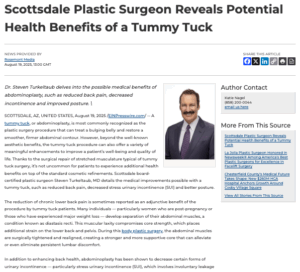
Dr. Steven Turkeltaub delves into the possible medical benefits of abdominoplasty, such as reduced back pain, decreased incontinence and improved posture.
Scottsdale, AZ — A tummy tuck, or abdominoplasty, is most commonly recognized as the plastic surgery procedure that can treat a bulging belly and restore a smoother, firmer abdominal contour. However, beyond the well-known aesthetic benefits, the tummy tuck procedure can also offer a variety of meaningful enhancements to improve a patient’s well-being and quality of life. Thanks to the surgical repair of stretched musculature typical of tummy tuck surgery, it’s not uncommon for patients to experience additional health benefits on top of the standard cosmetic refinements. Scottsdale board-certified plastic surgeon Steven Turkeltaub, MD details the medical improvements possible with a tummy tuck, such as reduced back pain, decreased stress urinary incontinence (SUI) and better posture.
The reduction of chronic lower back pain is sometimes reported as an adjunctive benefit of the procedure by tummy tuck patients. Many individuals — particularly women who are post-pregnancy or those who have experienced major weight loss — develop separation of their abdominal muscles, a condition known as diastasis recti. This muscular laxity compromises core strength, which places additional strain on the lower back and pelvis. During this body plastic surgery, the abdominal muscles are surgically tightened and realigned, creating a stronger and more supportive core that can alleviate or even eliminate persistent lumbar discomfort.
In addition to enhancing back health, abdominoplasty has been shown to decrease certain forms of urinary incontinence — particularly stress urinary incontinence (SUI), which involves involuntary leakage during activities such as coughing, laughing or exercising. Strengthening the abdominal wall and, in some cases, repositioning soft tissue structures can enhance pelvic support and reduce bladder pressure, leading to a noticeable improvement in bladder control for many patients.
Straighter posture is also possible after abdominoplasty. A bulging or weakened abdomen can encourage a slouched stance and spinal misalignment. By flattening the abdominal profile and tightening the core, patients often find it easier to maintain proper posture. This not only reduces strain on the spine and hips, but also contributes to better overall body mechanics during movement and exercise.
Dr. Turkeltaub emphasizes the importance of outside research and patient education prior to committing to abdominoplasty. By working alongside a highly experienced and well-qualified plastic surgeon, patients can learn exactly what’s possible with the tummy tuck procedure, including its potential benefits and limitations.
About Steven Turkeltaub, MD
Dr. Steven Turkeltaub is a board-certified plastic surgeon in Scottsdale specializing in aesthetic surgery, particularly face, breast and body procedures as well as gender-affirming top surgery. Dr. Turkeltaub earned his Bachelor of Arts (BA) and Doctor of Medicine (MD) degrees at Boston University School of Medicine in six years instead of the standard eight, later completing his plastic surgery training at The University of Massachusetts Medical Center. He is the founder, lead clinician and Medical Director at The Arizona Center for Aesthetic Plastic Surgery, as well as an active member of the American Society of Plastic Surgeons (ASPS), The Aesthetic Society (formerly ASAPS) and the Arizona Society of Plastic Surgeons. Dr. Turkeltaub is available for interview upon request.
To learn more about Dr. Turkeltaub and his practice, visit turkeltaub.com, arizonabreast.com, and facebook.com/drturkeltaub, or find the practice on Instagram @drsteventurkeltaub.
Contact:
Arizona Center for Aesthetic Plastic Surgery
8502 E. Princess Dr.
Suite 240
Scottsdale, AZ 85255
(480) 451-3000
Rosemont Media
(858) 200-0044
www.rosemontmedia.com
